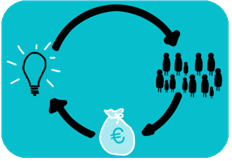 Crowdfunding websites like Kickstarter and Indiegogo have raised hundreds of millions of dollars for businesspeople and artists looking for quick injections of cash. But what has it done for the people who actually contributed to these campaigns? While many crowdfunding drives offer prizes and gifts to their donors, they don’t provide participants with ownership stakes like other methods of investment. That’s why a new wave of crowdfunding platforms are coming on the scene to make this burgeoning financing strategy more like traditional equity purchases.
Crowdfunding websites like Kickstarter and Indiegogo have raised hundreds of millions of dollars for businesspeople and artists looking for quick injections of cash. But what has it done for the people who actually contributed to these campaigns? While many crowdfunding drives offer prizes and gifts to their donors, they don’t provide participants with ownership stakes like other methods of investment. That’s why a new wave of crowdfunding platforms are coming on the scene to make this burgeoning financing strategy more like traditional equity purchases.
Microventures, for instance, serves as a kind of online marketplace for startups to hook up with wealthy investors. Entrepreneurs create profiles and plead their cases on the social network just like they would on Kickstarter. Unlike that site, however, backers receive an equity stake in the venture commensurate with their investment. Although this is no different than the way startups already seek out seed cash, the digital platform allows entrepreneurs to meet interested parties online without hopping from meeting to meeting. So far the company has handled more than $8 million in investments through 25 different campaigns with six more currently in development.
While Microventures is useful for established entrepreneurs, it fails to serve the up-and-coming individuals who normally utilize crowdfunding sites. Fortunately, that’s where Upstart comes in. This new crowdfunding venture provides young entrepreneurs with sizable investments from reputable sources in exchange for stakes in future profits. Unlike Kickstarter, which acts as a funding platform for ideas, Upstart is focused on people. For example, Omri Mor graduated from the University of Wisconsin with just $182 in his bank account and an idea for an independent music marketplace in his mind. Through Upstart he received $50,000 to spend on whatever he wanted. In return he would pay his backers a percentage of his future income over the course of a decade. This method grants entrepreneurs the freedom to pursue their goals at their own pace without fretting about that first failure. Investors, on the other hand, can receive a windfall if their wards manage to hit it big.
Questions:
- Why would investors prefer an equity stake in emerging ventures?
- Will investors buy into the concept of investing in individuals through Upstart?
Source: Logan Kugler, “Investing in the Future,” Entrepreneur, December 2012; Nick Leiber, “Crowdfunding Is About to Get More Crowded,” Bloomberg BusinessWeek, November 29, 2012. Photo by Rocio Lara.
